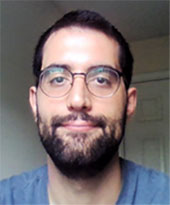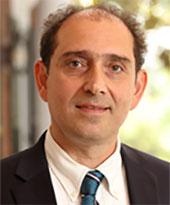Upcoming Webinar: 20 January 2021 by Dr. Charilaos I. Kanatsoulis and Dr. Nikolaos D. Sidiropoulos

Upcoming Webinar - 20 January 2021
Webinar Topic: "Tensor Completion from Regular Sub-Nyquist Samples"
Presenters: Dr. Charilaos I. Kanatsoulis & Dr. Nikolaos D. Sidiropoulos
Based on the IEEE Xplore® article
Tensor Decomposition for Signal Processing and Machine Learning, April 2017
| Presenters: Date: Time: Duration: Register: Download: |
Dr. Charilaos I. Kanatsoulis & Dr. Nikolaos D. Sidiropoulos 20 January 2021 11:00 AM EST (New York time) Approximately 1 hour Attendee Registration The original article is freely available for download on IEEE Xplore® |

The IEEE Signal Processing Society would like to express our concern and support for the members of our global community and all affected by the current COVID-19 pandemic. We appreciate your continued patience and support as we work together to navigate these unforeseen and uncertain circumstances. We hope that you, your families, and your communities are safe!
About this topic:
Signal sampling and reconstruction is a fundamental engineering task at the heart of signal processing. The celebrated Shannon-Nyquist theorem guarantees perfect signal reconstruction from uniform samples, obtained at a rate twice the maximum frequency present in the signal. Unfortunately, a large number of signals of interest are far from being band-limited. This motivated research on reconstruction from sub-Nyquist samples, which mainly hinges on the use of random/incoherent sampling procedures. However, uniform or regular sampling is more appealing in practice; from the system design point of view, it is far simpler to implement, and often necessary due to system constraints.
In this webinar, the presenters study regular sampling and reconstruction of three- or higher dimensional signals (tensors). They show that reconstructing a tensor signal from regular samples is feasible. Under the proposed framework, the sample complexity is determined by the tensor rank rather than the signal bandwidth. This result offers new perspectives for designing practical regular sampling patterns and systems for signals that are naturally tensors, e.g., images and video. For a concrete application, they show that functional magnetic resonance imaging (fMRI) acceleration is a tensor sampling problem, where design of practical sampling schemes and an algorithmic framework are used to handle it. Numerical results show that our tensor sampling strategy accelerates the fMRI sampling process significantly without sacrificing reconstruction accuracy.
About the presenters:

Charilaos I. Kanatsoulis received the diploma from the National Technical University of Athens, Greece, in 2014 and the Ph.D. degree from the University of Minnesota (UMN), Twin Cities, in 2020, both in electrical and computer engineering.
Dr. Kanatsoulis is a postdoctoral researcher in the Department of Electrical and Systems Engineering at the University of Pennsylvania. His research interests include signal processing, machine learning, tensor analysis, and network AI.

Nikolaos D. Sidiropoulos received the diploma from Aristotle University of Thessaloniki, Greece, and the M.S. and Ph.D. degrees from the University of Maryland at College Park, in 1988, 1990, and 1992, respectively, all in electrical engineering.
He served on the faculty of the University of Virginia, University of Minnesota, and the Technical University of Crete, Greece, prior to his current appointment as Louis T. Rader Professor and Chair of ECE at UVA. From 2015 to 2017, he was an ADC Chair Professor at the University of Minnesota. His research interests are in signal processing, communications, optimization, tensor decomposition, and factor analysis with applications in machine learning and communications.
Dr. Sidiropoulos received the NSF/CAREER award in 1998, the IEEE Signal Processing Society (SPS) Best Paper Award in 2001, 2007, and 2011, served as IEEE SPS Distinguished Lecturer (2008-2009), and served as Vice President - Membership of IEEE SPS. He received the 2010 IEEE Signal Processing Society Meritorious Service Award, and the 2013 Distinguished Alumni Award from the University of Maryland, Department of Electrical and Computer Engineering. He is a Fellow of IEEE (2009) and a Fellow of EURASIP (2014).

